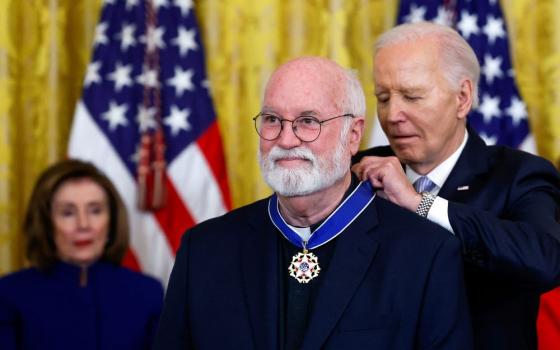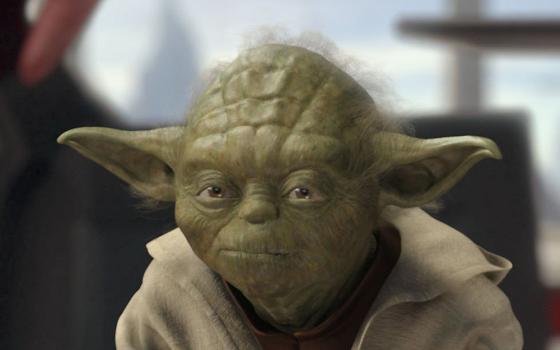
WASHINGTON -- The Catholic University of America June 15 named law professor John H. Garvey as its new president, effective July 1.
Garvey, 61, has been dean of the Boston College Law School for the past 11 years and is a nationally known constitutional law expert and author or coauthor of several books on religion and law.
He will be the 15th president of Catholic University and only the third layman to hold that post in the university’s 123-year history.
He said one of his goals will be to make the university of greater service to the large and growing Hispanic Catholic community in the United States.
Archbishop Allen H. Vigneron of Detroit, chairman of the university’s board of trustees and head of its presidential search committee, told reporters June 15 that if all else were equal, the committee would have selected a priest, as it usually has in the past, to lead the university.
Garvey, however, stood out above the 200 other candidates the committee considered for the job, he said. “Our goal was to choose the best candidate for the position, and I believe that is what we did.”
Garvey succeeds Vincentian Fr. David M. O’Connell, who announced last October that he would be stepping down this summer after 12 years at the helm. On June 4 Pope Benedict XVI named O’Connell coadjutor bishop of Trenton, N.J., and he is to be ordained a bishop July 30 in Trenton.
Garvey, a soft-spoken man with a ready smile, met first with reporters and then with students and faculty June 15 at the Edward J. Pryzbyla University Center, a student center built under O’Connell that has become a focal point of university life since its opening in 2003.
Addressing challenges facing Catholic higher education in the United States today, Garvey said at the press conference, “It is an especially exciting time for Catholic higher education because the Catholic church has made a conscious decision to expand and enliven its distinctive contribution to higher education.”
This is in contrast to the “increasing secularization” of religiously founded schools in much of the history of American higher education, he said, citing major universities like Princeton, Yale, Harvard, Brown and Chicago, which started as Protestant denominational schools.
Garvey noted that in 1990 Pope John Paul II, with his apostolic constitution on Catholic higher education, Ex Corde Ecclesiae, set a different trajectory for Catholic colleges and universities around the world, including the 230 in the United States -- a future “in which the faith that led to their founding added to, rather than subtracting from, the education that they provided.”
He promised to continue the promotion of the Catholic identity of the university that was a major emphasis during O’Connell’s tenure.
Another major challenge for Catholic University today is to reach out to Hispanic Catholics and prepare them for church and civil leadership, he said.
“We are going to have to appeal to a larger audience than we have traditionally been. The history of the Catholic church in America is one that has been largely promoted, staffed by Irish, Italian, German and Eastern European immigrants,” he said.
“But the Catholic church in the United States is becoming increasingly Latin,” he said. “Fifteen percent of the priests we ordain are Latino. A third of American Catholics are Hispanic, and more than half of American Catholics under the age of 25 -- that’s the college age and rising college age of the population -- more than half of those people are of Hispanic or Latino descent.”
On the need for academic excellence, he said that in his parents’ generation of Catholics, just going to college was the dream. “They didn’t necessarily distinguish one college from another -- just getting through was an accomplishment for them.”
Today “we need to play on a larger stage than some of us have been accustomed to playing on,” he said. “For our children, it’s a matter of intense concern what college they attend. And college is not the end of their educational careers, it’s a step on a longer path that might include graduate or professional schools.”
“In this world, The Catholic University of America is well situated to play an important role,” he added. “It’s a university that started as a graduate school, not a college.” In that respect, he noted, it is like some of the great German universities and like Johns Hopkins University in nearby Baltimore.
Incorporated civilly in the District of Columbia by the U.S. bishops in 1887 as an institute devoted primarily to research and graduate studies, The Catholic University of America is the U.S. church’s only official national university. It received a papal charter from Pope Leo XIII in 1889 and began its first classes in the fall of that year.
Graduate studies in philosophy, theology and canon law -- the three areas in which the university grants ecclesiastical, or Vatican-certified, degrees -- dominated the curriculum in the university’s early years. It remains the only U.S. Catholic institution that can grant such degrees in canon law and philosophy.
It was only in 1904 that Catholic University established an undergraduate program.
Today slightly more than half of the university’s 6,700 students are undergraduates. Its law school has 900 graduate students, and another 2,400 are studying for higher degrees in theology, philosophy, canon law, physics, engineering, music, social work and a variety of other fields.
In the 23 years before he became dean of Boston College Law School, Garvey taught law at the universities of Notre Dame, Michigan and Kentucky. He also served as assistant to the solicitor general in the U.S. Department of Justice from 1981 to 1984.
He is a 1970 graduate of Indiana’s University of Notre Dame and did a year of postgraduate theological studies at Harvard Divinity School in Massachusetts before turning to law and graduating from Harvard Law School in 1974.
He and his wife Jeanne have five children and 11 grandchildren. In comments on his devotion to Catholic education, Garvey noted that his children have cumulatively amassed 92 years of education in Catholic schools.
Previous lay presidents of Catholic University were Clarence C. Walton, 1969-78, and Edmund D. Pellegrino, 1978-82. All the others were priests or bishops, except for Christian Br. Patrick Ellis, who held the post 1992-98.







